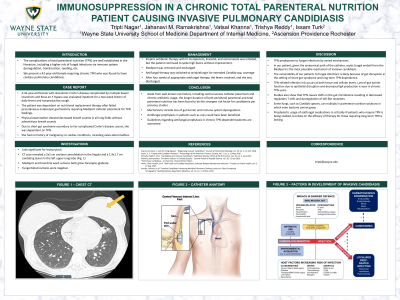Back

Poster Session E - Tuesday Afternoon
Category: Functional Bowel Disease
E0268 - Immunosuppression in Chronic Total Parenteral Nutrition Patient Causing Invasive Pulmonary Candidiasis
Tuesday, October 25, 2022
3:00 PM – 5:00 PM ET
Location: Crown Ballroom


Tripti Nagar, MD
Wayne State University
Rochester, MI
Presenting Author(s)
Tripti Nagar, MD1, Jahanavi Ramakrishna, MD1, Vatsal Khanna, MD1, Trishya Reddy, MD1, Issam A. Turk, MD2
1Wayne State University, Rochester, MI; 2Wayne State University School of Medicine, Rochester Hills, MI
Introduction: The complications of total parenteral nutrition (TPN) are well established in the literature, including a higher risk of fungal infections via immune system dysregulation, translocation, seeding, etc. We present a 42-year-old female requiring chronic TPN who was found to have cavitary pulmonary candidiasis.
Case Description/Methods: A 42-year-old female with ileocolonic Crohn’s disease complicated by multiple bowel resections and Roux-en-Y bypass was evaluated inpatient for a two-week history of daily fevers and nonproductive cough. The patient had a significant history of nutritional replacement therapy with failed percutaneous endoscopic gastrostomy requiring Mediport catheter placement for TPN feedings. Due to short gut syndrome, she was dependent on TPN. She had no history of malignancy or cardiac conditions, including valve abnormalities. CT scan revealed a 2x2 cm cavitary consolidation in the lingula and a 1.9x1.7 cm cavitating lesion in the left upper lung lobe. Voriconazole was initiated, but the patient continued to spike high fevers without improvement. The Mediport catheter was removed and sent for cultures. Bronchoscopy was also done. Mediport and bronchial wash cultures both grew Torulopsis glabrata. Fungal blood cultures were negative. After four weeks of appropriate antifungal therapy, the patient’s fevers resolved and she was discharged home in stable condition.
Discussion: TPN predisposes to fungal infections by varied mechanisms. In our patient, given the anatomical path of the catheter, septic fungal emboli from the Mediport is the most plausible mechanism of invasive candidiasis. However, the vulnerability of our patients to fungal infections is likely because of gut disruption in the setting of short gut syndrome and long-term TPN dependence. The risk of infection with TPN occurs at both tissue and cellular levels. Loss of gut barrier function due to epithelial disruption and decreased IgA production is seen in chronic TPN users. Studies also show that TPN causes shifts in the gut microbiome resulting in decreased regulatory T-cells and dysregulation of toll-like receptors. Furthermore, some fungi, such as Candida species, can multiply in parenteral nutrition solutions in which even bacteria cannot grow. Some care centers prophylactically start antifungals in critically ill patients who require TPN, but data on the efficacy of prophylactic antifungal therapy for those requiring long-term TPN is needed.
Disclosures:
Tripti Nagar, MD1, Jahanavi Ramakrishna, MD1, Vatsal Khanna, MD1, Trishya Reddy, MD1, Issam A. Turk, MD2. E0268 - Immunosuppression in Chronic Total Parenteral Nutrition Patient Causing Invasive Pulmonary Candidiasis, ACG 2022 Annual Scientific Meeting Abstracts. Charlotte, NC: American College of Gastroenterology.
1Wayne State University, Rochester, MI; 2Wayne State University School of Medicine, Rochester Hills, MI
Introduction: The complications of total parenteral nutrition (TPN) are well established in the literature, including a higher risk of fungal infections via immune system dysregulation, translocation, seeding, etc. We present a 42-year-old female requiring chronic TPN who was found to have cavitary pulmonary candidiasis.
Case Description/Methods: A 42-year-old female with ileocolonic Crohn’s disease complicated by multiple bowel resections and Roux-en-Y bypass was evaluated inpatient for a two-week history of daily fevers and nonproductive cough. The patient had a significant history of nutritional replacement therapy with failed percutaneous endoscopic gastrostomy requiring Mediport catheter placement for TPN feedings. Due to short gut syndrome, she was dependent on TPN. She had no history of malignancy or cardiac conditions, including valve abnormalities. CT scan revealed a 2x2 cm cavitary consolidation in the lingula and a 1.9x1.7 cm cavitating lesion in the left upper lung lobe. Voriconazole was initiated, but the patient continued to spike high fevers without improvement. The Mediport catheter was removed and sent for cultures. Bronchoscopy was also done. Mediport and bronchial wash cultures both grew Torulopsis glabrata. Fungal blood cultures were negative. After four weeks of appropriate antifungal therapy, the patient’s fevers resolved and she was discharged home in stable condition.
Discussion: TPN predisposes to fungal infections by varied mechanisms. In our patient, given the anatomical path of the catheter, septic fungal emboli from the Mediport is the most plausible mechanism of invasive candidiasis. However, the vulnerability of our patients to fungal infections is likely because of gut disruption in the setting of short gut syndrome and long-term TPN dependence. The risk of infection with TPN occurs at both tissue and cellular levels. Loss of gut barrier function due to epithelial disruption and decreased IgA production is seen in chronic TPN users. Studies also show that TPN causes shifts in the gut microbiome resulting in decreased regulatory T-cells and dysregulation of toll-like receptors. Furthermore, some fungi, such as Candida species, can multiply in parenteral nutrition solutions in which even bacteria cannot grow. Some care centers prophylactically start antifungals in critically ill patients who require TPN, but data on the efficacy of prophylactic antifungal therapy for those requiring long-term TPN is needed.
Disclosures:
Tripti Nagar indicated no relevant financial relationships.
Jahanavi Ramakrishna indicated no relevant financial relationships.
Vatsal Khanna indicated no relevant financial relationships.
Trishya Reddy indicated no relevant financial relationships.
Issam Turk indicated no relevant financial relationships.
Tripti Nagar, MD1, Jahanavi Ramakrishna, MD1, Vatsal Khanna, MD1, Trishya Reddy, MD1, Issam A. Turk, MD2. E0268 - Immunosuppression in Chronic Total Parenteral Nutrition Patient Causing Invasive Pulmonary Candidiasis, ACG 2022 Annual Scientific Meeting Abstracts. Charlotte, NC: American College of Gastroenterology.
